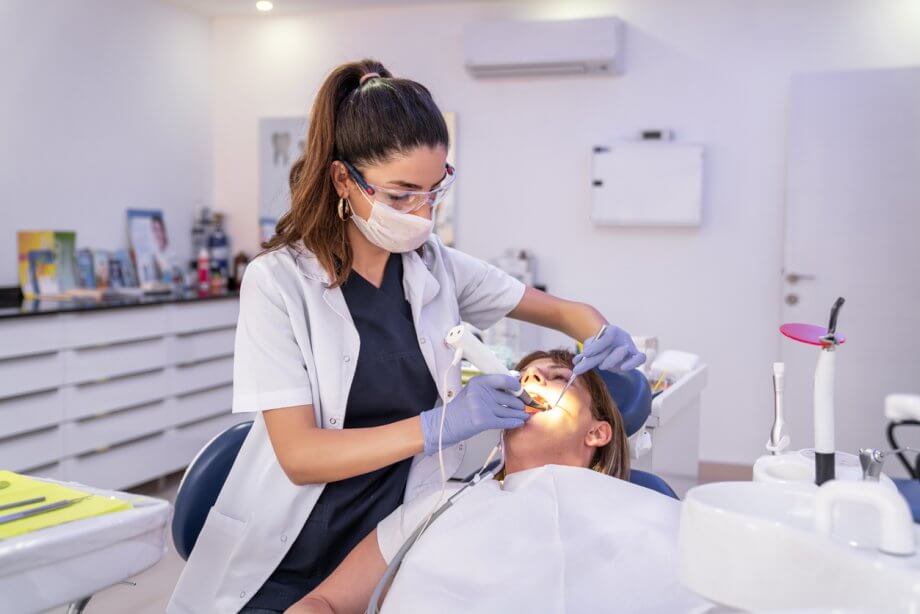The COVID-19 pandemic affects every field of medicine, including dentistry and the field of endodontics. Many dental practices are only treating urgent or emergent cases. What is considered an endodontic or dental emergency?
The American Dental Association (ADA) defines a dental emergency as a potentially life-threatening situation in which immediate treatment is required to stop ongoing tissue bleeding, alleviate severe tooth pain or infection, treatment of cellulitis (a diffuse soft-tissue bacterial infection with intra-oral or extra-oral swelling that potentially compromises the patient’s airway) or trauma involving facial bones, potentially compromising the patient’s airway.
For example, an emergent case would be a patient who is in extreme tooth pain. This would consist of patients suffering from an inflamed or infected tooth, resulting in the need for a root canal procedure. A recent study conducted in Wuhan titled “Characteristics of Endodontic Emergencies During COVID-19 Outbreak in Wuhan” found that endodontic emergencies make up a much higher portion of dental emergencies in high-risk areas for COVID-19 than in other areas with lesser risk. So what does this mean for dentists and patients?
Is it Safe to Get a Root Canal?
As a patient, you may be wondering if it is safe to have a root canal procedure performed with the risk of COVID-19. The disadvantage to root canals is that they are long, in-depth procedures that allow the endodontist and the patient to be potentially exposed to the virus longer. The virus is known to be transmitted through saliva, which is nearly impossible for the endodontist or to avoid when performing a root canal procedure within the patient’s mouth.
Of course, the endodontist and staff will wear protective gear and take every possible precaution during the procedure. Even so, reducing the amount of time spent on dental and endodontic procedures would be a clear advantage to both parties, the dentist and the patient.
What Other Precautions May Be Taken to Reduce the Risk of Spreading COVID-19?
In addition to shorter treatment times, research has shown that the following safety precautions are also crucial in preventing the spread of COVID-19:
- Screening patients for symptoms. Any potential patient should be screened for COVID-19 symptoms prior to treatment. Vulnerable individuals should stay home and not seek treatment before April 30th. A patient that tests positive for COVID-19 should not be treated for a minimum of 14 days.
- Completing paperwork online. Patients will be sent a link and asked to complete as much paperwork prior to their appointment online.
- Protocol upon entrance into the office. Staff will open doors for you to minimize exposure contact. Patients will be asked to use hand sanitizer upon immediate arrival into the office, followed by having their temperature taken and a 1% Hydrogen Peroxide pre-rinse mouthwash.
- Protective gear worn by the endodontist. Endodontists and staff should wear masks, gloves, eye protection, gowns, and facial shields or some form of a barrier to contain any aerosols produced during the procedure.
- Rubber dental dam. A dental dam is a rubber/latex barrier placed over the mouth and around the tooth that is receiving treatment in order to isolate the infection to just that area. This is the standard of care for root canal procedures and is something routinely done for every root canal patient.
- Disinfection of surfaces. All surfaces in procedure rooms should be thoroughly disinfected between patients. Every item a patient touches, doorknobs, bathroom light switches, etc. should be immediately wiped down.
Contemporary Endodontics of Oklahoma Helps to Prevent the Spread of COVID-19
As with every dental practice, Contemporary Endodontics of Oklahoma is doing our part to prevent the spread of COVID-19. We are seeing patients on an emergency basis and will do everything possible to treat your case in the best possible way.
If you are in need of endodontic services, call 405-285-5042 to schedule a consultation or request an appointment. We will do our best to accommodate you as soon as possible.

